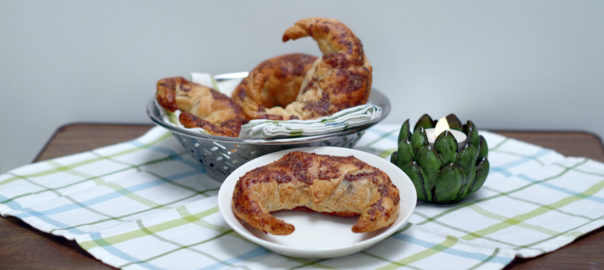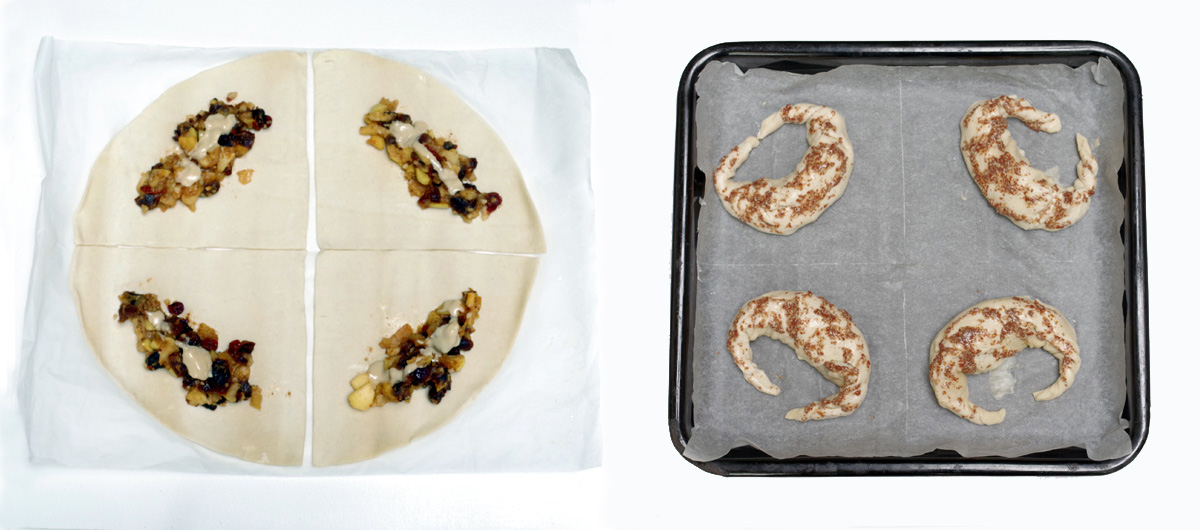Yoga Kitchen – Simple, healthy and plant-based
A moment of Sunday bliss
Well sure, croissants and viennese pastries are not healthy food. I remember how I ate way too many of them during my college days. It was convenience food. Quickly store-bought and rapidly devoured. Still, we don’t have to go through life as purists and, if your diet is generally healthy, you can enjoy this kind of heavenly smelling pastry from time to time.
By the way, it is very easy to make a much healthier, plant-based version of it.
In doing so, you start from a roll of vegan puff pastry. Unlike ready-made croissants and viennese cakes, the vegan puff pastry rolls are already quite widely available in a plant-based version. Just ignore the rolls that boast “made with real butter” on the packaging.
And the filling? You can decide for that yourself, with healthy ingredients of your choice. A world of difference from the oversweetened fillings full of refined sugar or glucose syrup of unclear origin.
Here is an example of stuffed croissants with an Ayurvedic touch.
For four croissants you will need:
- One roll of puff pastry without egg or milk products such as butter
- One medium-sized or two small organic apples
- Some dried organic fruit such as apricots, figs and/or dates
- One teaspoon of coconut oil
- 20 grams of white almonds
- One or two tablespoons of almond paste
- Warming spices such as: cinnamon, ginger, allspice and/or garam masala
- One tablespoon ground flaxseed
- Two tablespoons of water
This is how you prepare them
- Bring the crushed flaxseed into a bowl and mix with the water. Leave to rest for 15 minutes.
- Peel and cut the apples into pieces.
- Cut the dried fruit into pieces.
- Melt the coconut oil in a pan, stew the apples along with the dried fruit for a few minutes on low heat.
- Add the spices and remove from the heat. Leave to cool.
- Coarsely chop the almonds. For example by grinding them briefly in a food processor, while pulsing.
- Preheat the oven to 180 degrees.
- Take the puff pastry out of the fridge and let it soften for 15 minutes to make it easier to roll out.
- Roll it out and cut it crosswise into four equal quarter circles. Each quarter becomes a croissant.
- Moisten the 3 sides of each puff pastry triangle with water to increase their adhesive capacity.
- Place a quarter of the fruit mixture on each triangle.
- Then divide the almond butter over the four croissants.
- Divide and sprinkle the chopped almonds over each of the four triangles.
- Roll the croissants to close them, from the longest side towards the tip.
- Press the seams and spiralise the points so that the croissant is tightly sealed.
- Apply the soaked linseed generously on the outside of the croissants.
- Place the baking sheet in a baking tin and bake for about 20 minutes in the middle of the oven.
Let the croissants cool sufficiently after baking. I guarantee you’ll eat these healthier versions of your Sunday croissant in no time. At least in terms of flavour, they will briefly transport you into a state of nirvana that you will crave more often.
How does cooking within Ayurvedic nutritional teachings look like?
The suggested mixture of fruits, nuts and warming spices for these Sunday croissants tastes delicious. You can also eat that on its own as breakfast on other days. It is totally in line with the Ayurvedic approach to cooking. Just deliciously warming in the cold season.
In Ayurvedic cooking philosophy, one aims to maximise the digestibility of food. Whole grains and pulses, such as rice and lentils, vegetables and also fruits in moderation are on the menu. In terms of preparation methods, cooking and heating are the rule. With lots of spices because these stimulate digestion.
Ayurvedic health philosophy is based on three basic constitutions or doshas: vata, pitta and kapha.Everyone has one or more doshas that predominate in their basic constitution. You prepare your meals by choosing foods that suit your overall constitution on the one hand. And on the other hand, you take into account seasonal influences and any imbalances that you want to correct.
Within this vision of nutrition, one avoids raw food as much as possible.
How does ayurvedic nutrition view the use of animal products?
Ayurveda is pre-eminently a vegetarian cooking philosophy.
there is no use of meat nor fish. Ayurvedic practitioners will only exceptionally prescribe them. And then only as a temporary cure, if someone’s health is really very severely debilitated.
Eggs are not on the food list either.
In terms of dairy products, there is very limited use of (fresh) cheese, which they call paneer in India.
There is one dairy product which, on the other hand, enjoys an extremely high status. That is ghee. Ghee is “clarified” butter. It is butter that has been brought to the boil and from which the protein content, which floats to the surface, is skimmed off. This makes the ghee keep for a very long time, even at room temperature.
It is considered almost a miracle ingredient within Ayurveda and people attribute all kinds of far-reaching health benefits to it.
My opinion about ghee
Personally, I think ghee is not done. Probably objectively, it is similar in nutritional value to coconut oil. Both are fats high in saturated fatty acids. Not bad in itself but better to use in moderation.
Energetically, coconut oil is cooling for our organism compared to ghee, which has a more warming effect.
Butter, and hence ghee, are both products of a merciless exploitation of cows by the food industry.The poor animals are artificially kept in lactation and separated from their newborn calves several times, year after year, immediately after birth. Unusually cruel and totally unnecessary.
And from whatever perspective you look at it, the frequency of the energy of that suffering you also absorb from the butter or ghee you consume. Better to avoid.
By eating more plant-based foods, we can actively contribute to ending this abusive and useless suffering.
As for me personally, I think this ethical consideration is the deciding factor, especially since coconut oil offers a good plant-based alternative.


